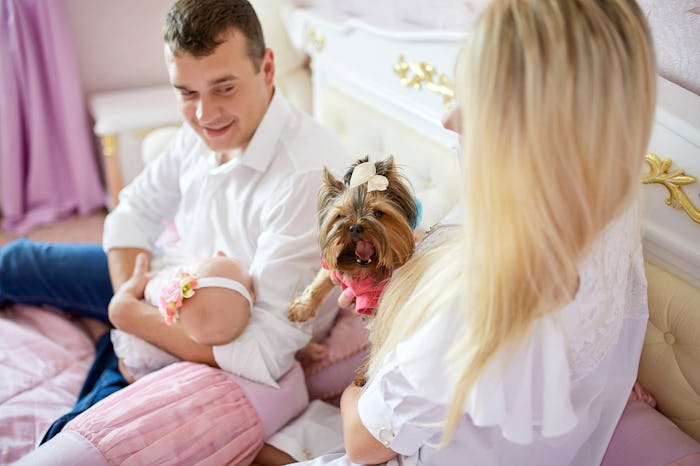Life

7 Signs Your Dog Has Some Anxiety About Your Baby's Birth
Being pregnant and having a baby is one of life's truest expressions of joy and love. It's also easily one of the most stressful for everyone involved, including your dogs. Think about it, for all of the time you've had your sweet pup, you've been constant companions. Sure, your relationship with your partner might have shifted things a bit, but really, he just gained a new lap to lie in. But babies? They bring a host of scary situations with them. There are even some signs your dog has anxiety about your baby's birth to look out for so that you can work at soothing your pup's transition.
It's not at all uncommon for dogs to experience some level of anxiety when they're introduced to a new baby, or even when their owner is pregnant. I spoke with Sally Morgan, a physical therapist specializing in pet therapy, and she tells Romper, "It is not unusual for dogs to become 'clingy' with a pregnant mom-to-be. They will stay close, show concern, and sit quietly nearby. This is because they can sense a change and seem to be aware of the heartbeat of the baby on board. Many dogs will show concern for a baby, watching closely, staring with a mix of excitement and interest. Do not confuse this with anxiety."
But she does note that "it is important that the pet parent knows the dog well and is able to read when the dog is stressed. Many dogs are very anxious with loud crying baby sounds, and it is sometimes good to put the dog in a room away from the baby when the baby is upset."
1He's Ignoring His Usual Habits
This is called a "displacement behavior." Say for instance your dog always follows you into the kitchen as you cook, and you drop him treats or little bits of what you're cooking. If when you get up to go into the kitchen, he looks like he's going to follow you, but then licks himself, turns away, or yawns, this is an indication of anxiety, according to Dog Gone Safe. The website wrote that "the dog wants to do something, but he is suppressing the urge to do it. He displaces the suppressed behavior with something else such as a lick or a yawn." It's his own behavior regulation. "The uncertainty of the situation causes conflict for the dog and the displacement behaviors are a manifestation of that conflict."
2He Looks Like He's About To Shake
It's a super cute look. Your dog, sitting there, one of her paws raised in the air. She looks so sweet, like she wants to shake. However, according to the Princeton Veterinary Hospital, this is a sign of anxiety and something you should be aware of.
3He Gets Rattled When Your Baby Cries
According to the American Society for the Prevention of the Cruelty of Animals (ASPCA), "If your dog is sensitive to strange noises, she might become agitated or frightened when she hears the baby cry." Shaking, low rumbles, and your dog following the sound with only their eyes are all signs that baby's cries are bothering your pup.
If this is the case, you'll want to start preparing your dog while you're pregnant. The ASPCA wrote that "to help her get used to the sound in advance, purchase a recording of realistic baby noises and play it frequently."
4They Avoid You, Your Baby, Or Your Partner
Have you noticed your dog leaving the room at odd times or turning their back to you when they'd normally be belly up? It might be a type of avoidance behavior. Dog Gone Safe wrote, "Sometimes dogs are more overt when they feel anxious and want to remove themselves from a situation. Please don't force a dog to stay in situation in which he feels anxious, especially if children are the source of his anxiety."
5Looks at You, Looks at the Baby, Repeat
Does your dog look like he's watching a tennis match when observing you and your baby, constantly looking back and forth between the two of you? According to a study in Plos One, this might mean they're feeling jealous and anxious around your baby.
6They're Not Peeing Where They Normally Do
Is your dog having accidents inside or not using their pads like they normally do? According to VetStreet, this is a classic symptom of canine anxiety. It can happen with a new pregnancy, moving, a new baby, or any upheaval.
7Irregular Body Posture & Movement
Morgan says that the most common forms of anxiety can be read in canine body posture and the noises they make. She notes that "anxious dogs whine, stand with a rigid posture, may wag their tails continuously and nervously, pace, or try to hide or get attention." These are all signs your dog isn't coping well.
She implores parents to keep a routine with their dog after baby arrives, saying, "It is very important to try to make time for your dog after the new baby arrives. Dogs who are part of the family need to remain so when the little one is here. Speaking quietly with the dog, including him in time with the baby, and also making a little private time to spend alone with the dog can all be helpful for everyone involved."